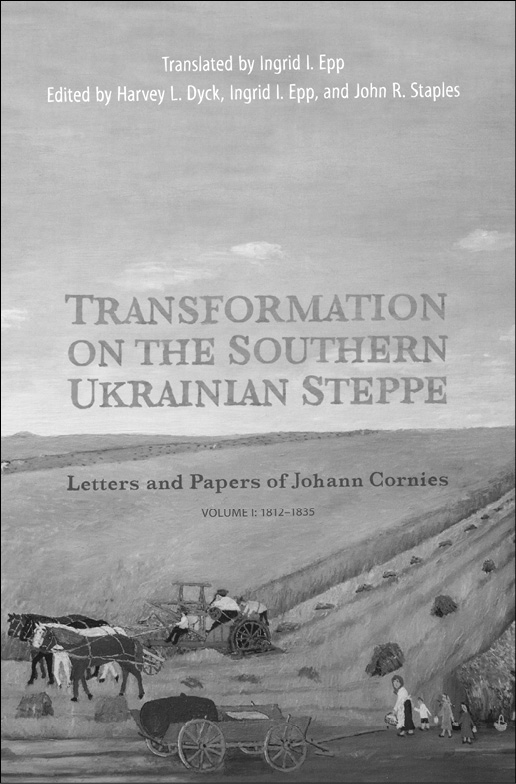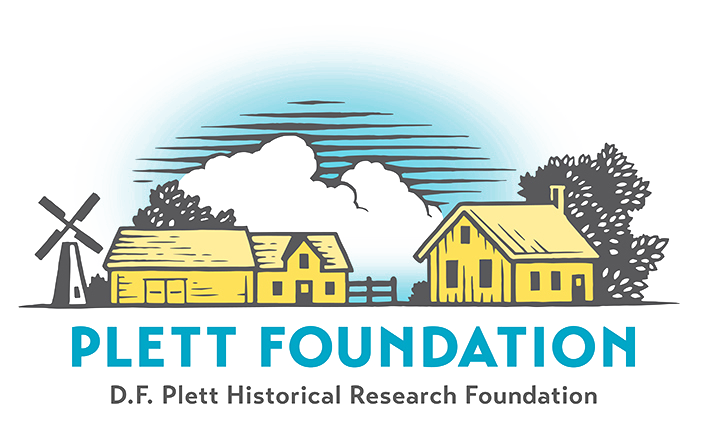Review: Transformation on the Southern Ukrainian Steppe, vol. 1
Transformation on the Southern Ukrainian Steppe: Letters and Papers of Johann Cornies, vol. 1, 1812–1835
Edited by Harvey L. Dyck, Ingrid I. Epp, and John R. Staples
Translated by Ingrid I. Epp
Toronto: University of Toronto Press, 2015, pp. 576. Hardcover
Reviewed by Aileen Friesen

This collection of Johann Cornies’ letters, the first of three slated volumes, offers an intimate portrait of the opportunities and challenges of frontier agrarian life in early nineteenth-century Russia.1 Cornies, who became renowned for his agriculture initiatives and reforms in the Molochna Mennonite community, corresponded with a variety of friends, relatives, acquaintances and state officials both within and outside of the Russian empire. These letters represent a significant resource for scholars interested in everyday provincial life in this multi-ethnic empire. As many of the original letters are extremely difficult to read, this volume ensures that researchers without skills in reading Gothic German script can still access these treasure troves of information. The late Ingrid I. Epp should be recognized for her masterful translations, which in the strong editorial hands of Harvey Dyck and John Staples bring to life the dynamism of Cornies’ world as his words and influence reached far beyond the confines of the Mennonite community.
Cornies’ correspondence offers new insight into how Mennonites engaged with each other, their neighbours, the environment, and Russian officials. Through their depictions of an assortment of themes from horse thievery and land disputes to cholera outbreaks and tensions over distilled alcohol licenses, these letters capture the personal and professional relationships and feuds that shaped early Mennonite economic and social development. They make clear that Mennonites were not quite as independent as they later would claim; the guiding hand of Russian officialdom was never too far, reminding Mennonites that they must fulfil the Tsarist state’s expectations in order to earn their privileges (227).
The letters reveal that Cornies acted as a gatekeeper not only to the Mennonite communities, but also to their neighbours. When a number of unexplained deaths occurred in one of the neighbouring Nogai villages, Andrei Fadeev, a guardianship official, relied on Cornies to obtain information (194). As it turns out, the deaths were the result of a cholera outbreak, which required the quarantine of infected villages. Cornies informed Fadeev that the Nogai had concealed the outbreak because they feared that doctors would disregard their Islamic practices and disturb the dead by digging up the bodies (201). Cornies’ ties to the Nogai community were deep, as evidenced by the frequent personal references to individual families that accompany his correspondence with Daniel Schlatter, a Swiss missionary who had lived among the Nogai (316). In fact, one of the most interesting documents of this collection is an ethnographic essay that Cornies published on the Nogai, which offers a detailed account of their social, religious, and cultural practices. Cornies’ assessment of the Nogai arguably revealed as much about the worldview of Mennonites as it did about the Nogai community.
While these letters offer only glimpses into Cornies personal religiosity, they are packed full of revelations on Mennonite business practices and the development of the local Molochna economy. Through his travels to buy merino sheep in Saxony, for instance, we encounter the difficulties of buying and transporting these new additions across borders and witness the resourcefulness of Mennonites as they navigate through the perils of bureaucratic regulations. Cornies shows a gift in managing business and people, a skill that helped him develop his own personal empire. As a father, he attempted to pass these lessons on to his son, offering counsel on how to handle people, money, and patronage, encouraged his son to travel physically, but not morally outside of the limits of the Mennonite world.
While the documents are wonderful, the placement of Johann Cornies and his correspondence within the historiography of the Russian empire could have been improved. John Staples admirably contextualizes Cornies as a leader within the Mennonite community; yet the introduction only superficially engages with the vast and rich literature on colonization and empire that has emerged over the past twenty years. In particular, Willard Sunderland’s pioneering study that gives agency to both state officials and settlers is dismissed as being centralist in focus; David Moon’s equally significant contribution on the role of settlers and scientists in the agricultural development of the steppe receive no mention. This critique, however, does not diminish the importance of this book, which offers a fresh new look into New Russia’s frontier communities.
- This review originally appeared in the Journal of Mennonite Studies, 2017. It is reprinted with permission from the author and from the Journal of Mennonite Studies. ↩︎
